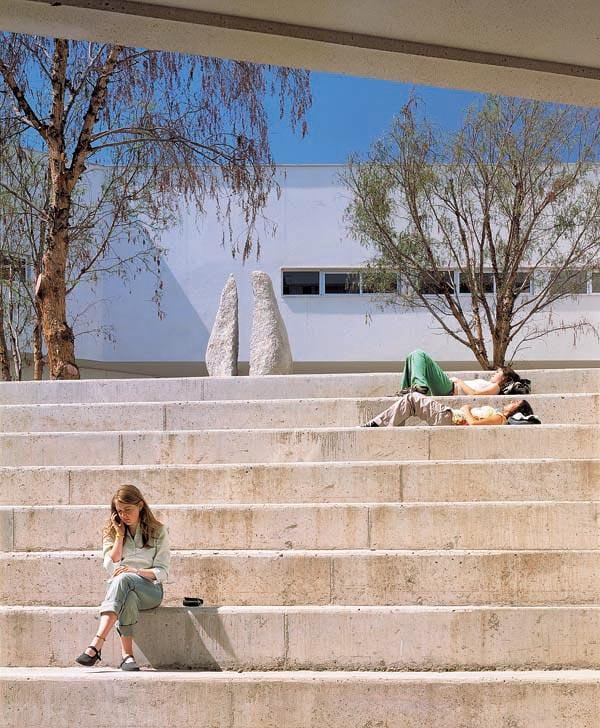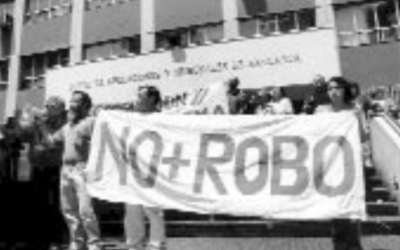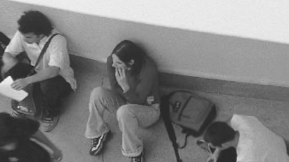The University Student Movement
’68 is only a memory

Students at Adolfo Ibañez University rest on the steps. Photo by Guy Wenbourne
Almost three months ago, I witnessed an event that truly describes the situation of the students in my country. The elections for the director of the Federation of Students were happening at the Universidad Católica de Chile, one of our two more prestigious universities. I stop to clarify that this University, where I study, is characterized by an extreme conservatism. Because the economic right, to a large extent, controls many of the most important Chilean companies, the graduates of my university were and are the most fervent followers of the neoliberal policy imposed by the dictatorship of Pinochet. Indeed, the rightist tradition has obtained year after year the support of the Federation of Students, with some exceptions. For this year, we wanted to teach a lesson and we tried to register a left list using a name that has been traditionally used by the right (a child’s game, perhaps) to prove that the students’ vote is conditional upon a name and not on a concrete platform that satisfies their needs. We were able to obtain the necessary signatures to register this list–two hundred–at the last moment, because it is still feared in Chile to say “I am of the left.” We went to the inscription place and received our ballot sheets, thinking we had already won. Hours later, I received the news that it had not been possible to register our list because, mysteriously, a page with names had disappeared and therefore, we did not fulfill the minimum signature requirement. There was no other copy of those wrinkled pages that we thought would serve to wake up the lethargy of the students of the Universidad Católica, and with empty hands and impotent faces, we saw, once again that the right, with almost sixty percent of the votes, took control of the power in the Federation of Students.
While writing this anecdote, I realized that in many other places of Chile, similar events often occur. I believe that after the arrival of democracy in Chile, we students are no longer valuable interlocutors. Over thirty years ago, student organizations were solid, conscientious and applied in their objectives. Today, on the contrary, student leaders are not more than the germ of future political leaders, the political parties use them to extend their increasingly fragile bases of support. The streets are the scene of violent manifestations repressed like in the most severe years of dictatorship, but, in addition, I see with frustration that the young people who march do not know why they do it, nor know if they want to really do it. The voice of the students becomes the voice of the young people, a voice that is not heard in the middle of the applause for the Free Trade Agreement, nor in the discussions about the next president of Chile. There’s a lack of valid reference points to encourage students to organize themselves and work toward a common cause.
I dare to say that nowadays, a solid student movement in Chile does not exist. The ideas of change, university reform and education for everyone are stuck in the middle of the generalized apathy that young people feel about these policies. The problem is that we who really felt the necessity to create a student group resurgence were lost in the same networks which we want eliminated. I can only hope that more sooner than later the great tree-lined avenues are witness to mobilized students with new objectives of solidarity, hope and change.
El movimiento estudiantil
’68 es solo una memoria
Por Cecilia Riveros Romero
Hace casi tres meses fui testigo de un hecho que describe la situación de los estudiantes en mi país. Se desarrollaban las elecciones para la directiva de la Federación de Estudiantes de la Universidad Católica de Chile, una de nuestras dos más prestigiosas universidades. Me detengo para aclarar que esta Universidad, donde yo estudio, se caracteriza por un extremo conservadurismo y porque la derecha económica en gran parte dueña de las más importantes empresas chilenas ha salido de sus aulas—sus ex alumnos fueron y son los más fervientes seguidores de la política neoliberal impuesta por la dictadura de Pinochet—de lo que se desprende que la tradición derechista ha obtenido año tras año la dirección de la Federación de Estudiantes, con algunas excepciones. Para este año, quisimos dar una lección e intentamos inscribir una lista de izquierda utilizando el nombre que tradicionalmente ha utilizado la derecha (juego de niños, tal vez) para probar así, que el voto de los estudiantes está condicionado por un nombre y no por un programa concreto que satisfaga sus necesidades. Cumplimos con el requisito de la cantidad de nombres necesarios para inscribir dicha lista—doscientas—a último momento, porque aún hay miedo en Chile de decir “soy de izquierda”, y nos dirigimos al lugar de inscripción, recibieron nuestra lista de nombres y nos fuimos creyendo que estaba todo listo. Horas después, recibí el aviso de que no había sido posible inscribir nuestra lista porque, misteriosamente, había desaparecido una hoja con nombres, por lo tanto, no se cumplía con el requisito mínimo. No había otra copia de esas hojas arrugadas que pensábamos servirían para despertar del letargo a los estudiantes de la Universidad Católica, y con las manos vacías y los rostros impotentes, vimos, una vez más como la derecha, con casi el sesenta por ciento de los votos, se hacía nuevamente con el poder en la Federación de Estudiantes.
Al llevar al papel esta anécdota pienso que en muchos lugares de Chile ocurre lo mismo, siento, que tras la llegada de la democracia los estudiantes ya no somos interlocutores válidos como hace un poco más de treinta años, cuando la organización estudiantil era sólida, conciente y aplicada en sus objetivos. Hoy, por el contrario, los dirigentes estudiantiles no son más que el germen de futuros dirigentes políticos, son jóvenes instrumentalizados por los partidos para ampliar sus cada vez más endebles bases de apoyo. Las calles son escenario de violentas manifestaciones reprimidas como en los más severos años de dictadura, pero, además, veo con desazón que los jóvenes que marchan no saben por qué lo hacen, ni saben si quieren hacerlo realmente. La voz de los estudiantes se convierte en la voz de los jóvenes, una voz que no es oída en medio de los aplausos por los tratados de libre comercio, ni por las discusiones acerca de quien será el próximo presidente de Chile. No hay referentes válidos que animen a los estudiantes a actuar con más cautela y luchar solidariamente por beneficios para todo el movimiento.
Me atrevo a decir que hoy en día no existe un movimiento estudiantil sólido en Chile, las ideas de cambio, de reforma universitaria y de educación para todos se difumina en medio de la apatía generalizada que sienten los jóvenes por la política. El problema está en que los que realmente sentimos la necesidad de hacer resurgir un estudiantado fuerte y consciente nos confundimos en las mismas redes de las cuales queremos salir infructuosamente. Sólo espero, que mucho más temprano que tarde las grandes alamedas vean pasar a los estudiantes con nuevos objetivos de solidaridad, esperanza y cambio.
Spring 2004, Volume III, Number 3
Cecilia Riveros Romero is a history student at the Pontificia Universidad Católica de Chile. She can be reached at carivero@puc.cl.
Cecilia Riveros Romero es estudiante de historia en la Pontificia Universidad Católica de Chile. Puede ser contactada en carivero@puc.cl.
Related Articles
Poverty or Potential?
Teresa stops me three blocks from Nueva Imperial’s main plaza on a quiet Wednesday morning, eager to chat. She is wearing a light blue sweater and a matching blue headband glowing slightly against her dark black hair.
Editor’s Letter: Chile
I was hesitant to do an issue on Chile when I had other topics broader and richer in content. Although in a way Chile seems like an obvious choice because of the DRCLAS Regional office there, I felt there were other priorities in terms of substance.
Three Students, Three Experiences
I was extremely impressed with how successful the Chilean health system has been in improving the health of its citizens despite its limited resources. Its success, however, in many…




